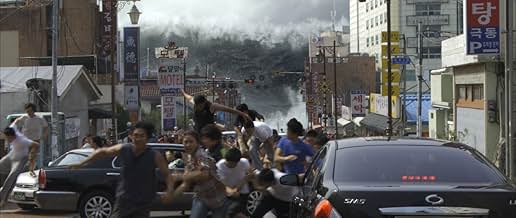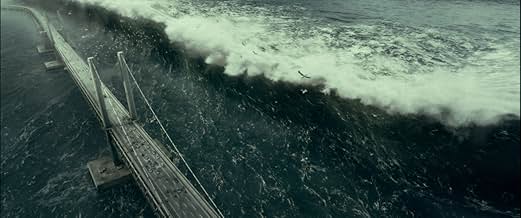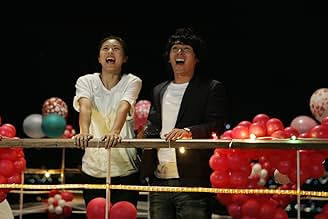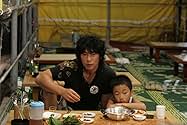O geólogo marinho Kim prevê a chegada de um mega tsunami que promete destruir tudo em seu caminho. Ele tenta desesperadamente alertar as autoridades e turistas inocentes sobre a catástrofe p... Ler tudoO geólogo marinho Kim prevê a chegada de um mega tsunami que promete destruir tudo em seu caminho. Ele tenta desesperadamente alertar as autoridades e turistas inocentes sobre a catástrofe para salvar o máximo de vidas que puder.O geólogo marinho Kim prevê a chegada de um mega tsunami que promete destruir tudo em seu caminho. Ele tenta desesperadamente alertar as autoridades e turistas inocentes sobre a catástrofe para salvar o máximo de vidas que puder.
- Direção
- Roteiristas
- Artistas
- Prêmios
- 6 vitórias e 13 indicações no total
- Yeon-Hee
- (narração)
- Direção
- Roteiristas
- Elenco e equipe completos
- Produção, bilheteria e muito mais no IMDbPro
Avaliações em destaque
So, perhaps, this is the first step towards healing: a big blockbuster that doesn't really elevate the form from previous American big-budget summer disaster-movie blockbusters, but doesn't suck like a box of Michael Bay d***s either. The film, named after a shore-line city, follows a group of characters in a series of semi (or not at all) connected plots, including one with a man who previously caused the accidental death of another while they worked on a boat during tsunami 2004 and has to reconcile with his alcoholism and a possible new love, another with a new coast-guard worker and his (unintentional) love interest, and a guy working at the weather-control center who has a very estranged relationship with his ex and his daughter who doesn't even know he's her father (since, you know, he works non-stop at a weather center tracking earthquakes and the like).
For the first hour, or maybe more, there are some big laughs and some entertainment to be had, if only on that shallow-surface level one might be familiar with in an Independence Day kind of fold-out (or for the older folks Towering Inferno). With the exception of the young coast-guard guy and the twerpy girl who is or isn't trying to court him depending on her mood, which just sucks, the plots are at least sort of engaging on a fun-dumb movie level. And even with the shots of visual effects that look terrible (and some of it is SyFy level quality), when the actual tsunami hits the city it is quite a sight and thing to experience, especially with a full audience. The problem that Yun comes with though is both the script, its uneven plot threads and hit-or-miss humor (some of it is very funny, intentionally so, including a giant explosion scene on a bridge during the tsunami climax), and in corralling some of the acting.
From what I hear, some Korean movies do swing and sway quite wildly between moods from scene to scene, and it isn't usually consistent even in the best films (exceptions I think might be Bong Joon-Ho and Chanwook Park's films). But here in Haeundae it breaks down like this: two-thirds of this is a decent crowd-pleaser, what my wife called a "mixed salad" kind of entertainment. And then in the last twenty-five minutes it turns into more or less a total weepy, so much so that you'll either fall for it completely Titanic style (and lo and behold many in the audience I saw the film with, mostly Korean-Americans or Koreans in town in NYC, were in tears), or you'll be scratching your head or simply cringing at the hysterics on display. It's never too terribly directed, but after so much of it... you wonder when it will end. It's a good start for a possible future genre Korea can take some more cracks at. It's just not something you need to rush to see. Unless you're a die-hard Roland Emmerich/Korea fan. And yes, fan of Korea, not even Korean movies.
It's a shame, then, that the surrounding movie is so poor. Tidal Wave takes an hour to get to the disaster stuff, and until that time we're treated to Korean comedy. Now, I don't mind a bit of comedy, the quirkier the better; THE HOST had a lot of fun moments. But this comedy is something else, the comedy of ridiculous characters behaving ridiculously, almost on a sub-slapstick standard. The over-the-top acting is absolutely appalling; I avoid American comedies on principle but this is even worse than those.
Of course, disaster movies always have to build up to the disaster, and I fully understand the need to develop the characters before dropping them in the clag. But, in my mind, the film should always be about the disaster, even before it occurs: have characters making warnings that are unheeded, or build suspense and foreboding with minor events preceding it. DANTE'S PEAK is a case in point of how to achieve this. TIDAL WAVE sits in a completely different, and entirely superfluous, genre until the actual disaster occurs.
Once the chaos gets underway, things get a lot better, although there's a reliance on overwrought melodrama which will test the patience of even the most hardened viewer, I imagine. Endless scenes of characters facing death, drawn out in painful slow-motion and with maximum crying, screaming, sobbing and telling each other they love them. Such scenes are a personal pet hate of mine, and they threaten to overwhelm the film even when the going gets good. It's a real shame, as with access to those special effects TIDAL WAVE could have, and should have, been a true great.
It began as a comedy and ended up a sorrowful one... Please set the mood right. The pacing of the movie was relatively even, and yes, the coming tsunami was... underwhelming.
The main actors are all pretty convincing, but the supporting ones are just that.... supporting ones. Their acting could only be called flaky, at best.
Let me get this out of my system. Japanese have one of the most advanced earthquake/tsunami early warning systems in the world. the Korean scientists made their Japanese counterparts sound like they were extremely I thought the ending was also too drawn out and long-winded. This movie would only be good when you are left with nothing better to watch.
There are numerous accounts of heroics and tragedy following every disaster, and it's not a surprise that they have become fodder for mass entertainment. We had 252: Signal of Life as the Japanese offering to the disaster genre earlier this year, and the Koreans too have decided to match that with Haeundae: The Deadly Tsunami. With 252 it was the disaster hitting hard and fast first, followed by the shoving of human melodrama down your throat, and thankfully though Haeundae is quite the opposite, having the human drama established first without feeling forced, before the special effects extravaganza took over.
So if you belong to Camp Impatient, then you're likely to feel bored as the film sought to introduce the ensemble characters, each with their respective back-stories and selfish reasons why they go about doing what they are doing, of course with repercussions all nicely built in as well for some karmic response. There's the fisherman and the romance with the daughter of a man whom he had caused the death of, and this provided most of the emotional anchor for the film. Then there are others like the opposites attract with the coast guard and the free-spirited girl from Seoul, a seemingly scheming politician who's in some kind of en-bloc mess with the folks of the coastal village, a much maligned scientist and his estranged wife and daughter, and enough overbearing mothers.
All these provided some 60 minutes worth of dramatic run time before it's time for Nature to hit back with its tidal waves, where quick response to an actual event will save lives, which stemmed from complacency creeping in when early warning signals went uncalled for. The filmmakers here had realistically created the phenomenon of the massive tidal waves with the receding waters and such, and the effects here were nothing short of eye-popping. Fear-inducing even, though there was one quick scene which seemed lifted from Hollywood's Deep Impact upon reconciliation of 2 characters in the face of impending doom.
But of course budget dictated that the effects could only sustain the movie for a short while, and anything more than 2 wave cycles would probably either be cost-prohibitive, or just plain dragging out the misery of the characters in their preservation of lives. Some fade-to-black-at-opportune-moments also came to the rescue of the film, and cheesiness reined comical supreme needlessly as well, though no efforts were spared in others especially the one involving the little girl left in the hotel room, providing that edge-of-your-seat thrills in what would be a literal roller-coaster ride in the last half hour.
Haeundae served more as a disaster film without any preachy overtones regarding the preservation of the environment. In earnest, I thought the release of this film was more like serving up an appetizer to the bigger budgeted extravaganza come November with 2012. That, I want to see.
Você sabia?
- CuriosidadesThe CGI tsunami sequences had been shot at Kerner Optical's stages using water-dump tanks left over from special effects sequences of Indiana Jones e o Reino da Caveira de Cristal (2008) in San Rafael, California in November and December 2008, months before any principal photography began in South Korea
- Erros de gravaçãoWhen the grandmother is watching the wave come in on the bridge, an aerial point-of-view shot shows the wave yet the height of the water around the footings remains constant.
- Citações
Helicopter Pilot: We need to adjust those settings, this doesn't look right.
Emergency Room Intern: James, James! James! We need to look at this. Something strange.
[He shows the man the paper]
Helicopter Pilot: Oh my god!
Emergency Room Intern: Why am I jumping to this? Just listen up! Move the people somewhere higher okay! It's the Tsunami!
Principais escolhas
Detalhes
Bilheteria
- Orçamento
- ₩ 10.000.000 (estimativa)
- Faturamento bruto mundial
- US$ 71.283.278
- Tempo de duração
- 2 h(120 min)
- Cor
- Mixagem de som
- Proporção
- 2.35 : 1



































